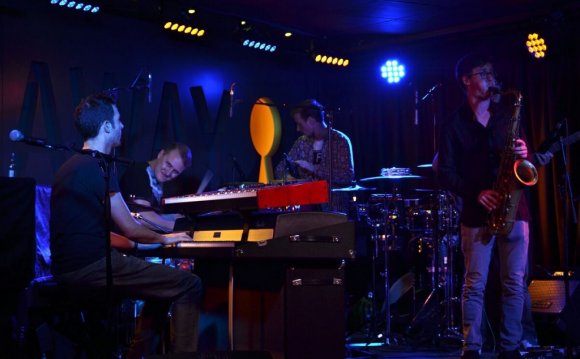
 In these times of governmental turmoil, songs and art acts an essential purpose, challenging its market to reconnect with truth and beauty despite the world’s destructive causes. These performers bring to life a remarkable custom of Middle Eastern and North African jazz songs prompted by the category grounded in African United states cultural record. Their particular music rekindles our souls and offers united states a vision for a world filled with beauty and imagination. We hope you like around we do!
In these times of governmental turmoil, songs and art acts an essential purpose, challenging its market to reconnect with truth and beauty despite the world’s destructive causes. These performers bring to life a remarkable custom of Middle Eastern and North African jazz songs prompted by the category grounded in African United states cultural record. Their particular music rekindles our souls and offers united states a vision for a world filled with beauty and imagination. We hope you like around we do!
North African jazz giant Malika Zarra switches from Tamazight to Arabic to French inside her songs, which may have a brand new vigor and richly layered quality. Fusing Chaabi, Amazigh, Gnawa, and Jazz influences, Malika features done all over the world in some of the very most prestigious songs venues and celebrations such as the Lincoln Center, Carnegie Hall, plus the London Jazz Festival. As Phil Freeman of Global Rhythm writes, “Malika Zarra is a multi-cultural shape-shifter, an enchantress just who leaps effectively between apparently unconnected languages and practices, uniting them while making use of each to further enrich the others.
Loading mideas·tunes player…
"Born in Tehran, Iran in 1984, soon after female singers were restricted from doing in public areas, Tara Tiba started the woman music journey at age nine learning Western traditional piano. At sixteen she developed a pursuit in Persian songs, getting into seven several years of vocal trained in the traditional Persian ‘Radif’ system, under among nation’s many prominent vocalists, Hengameh Akhavan. This age-old oral transmission from master to pupil accesses the deep social custom of Iran’s ancient music, inspiring Tara’s ongoing musical journey up to todays. In 2012, Tara moved to Australian Continent and formed her own musical organization featuring both Persian traditional and jazz performers. Tara extends the applications of Persian improvisational custom into wider music areas, looking for wider communication with an international audience.” ( -taratiba.com)
 Loading mideas·tunes player…
Loading mideas·tunes player…
3. Amira Kheir - Sudan
“Sudanese-Italian singer Amira Kheir happens to be charming viewers worldwide with a sound inspired by old-fashioned music from her homeland Sudan and rooted in Jazz with elements of Soul, African and center Eastern songs. The end result is a distinctive amalgamation of arrangements and instrumentation that give tasters of Sudan’s wealthy musical and social history whilst becoming reflective of this artist’s Afrocentric and Jazz music impacts.” (–amirakheir.com)
4. Rima Khcheich - Lebanon
Picture Credit: Al-Akhbar
Lebanese singer Rima Khcheich came to be into the village of Khiam in southern Lebanon, in 1974 and started her singing career within young age of nine. After becoming successful as a global musician, Rima features continued to grow in worldwide repute and admiration on her gift in doing complex Arabic classical types particularly Dor 'Emta El hawa’, and Muwashah “Anta al Mudallal.” Since 2001 she's got collaborated aided by the esteemed Dutch jazz ensemble, the Yuri Honing Trio, and has taped three albums – “Orient Express”, “Yalalalli” and her most recent launch, “Falak” – in which she effortlessly melds the set up Arabic tune arsenal to the western jazz idiom, producing an exciting brand new sub-genre.
After becoming successful as a global musician, Rima features continued to grow in worldwide repute and admiration on her gift in doing complex Arabic classical types particularly Dor 'Emta El hawa’, and Muwashah “Anta al Mudallal.” Since 2001 she's got collaborated aided by the esteemed Dutch jazz ensemble, the Yuri Honing Trio, and has taped three albums – “Orient Express”, “Yalalalli” and her most recent launch, “Falak” – in which she effortlessly melds the set up Arabic tune arsenal to the western jazz idiom, producing an exciting brand new sub-genre.
“Blessed with a vocals that’s as effective and gutsy since it is gentle and seductive, Iness Mezel is a singer/songwriter whose multi-cultural noise fuses funk, soul, and jazz utilizing the North African Amazigh and Berber noises of the woman Kabyle roots. A Normal stand-in singer for various groups when you look at the Chatelet location, she applied jazz improv with continental vocalist Sara Lazarus and joined the backing selection of well known Algerian musician Djur Djura before forming a duo with sis Malika.” (-artist biography by Jon O'Brien) Mezel today performs solamente and her third album “Beyond the Trance” was launched in 2011.
Rabih Abou-Khalil spent my youth in Beirut and relocated to Munich, Germany through the civil war in 1978. He learned in the Beirut conservatory at the hands of oud virtuoso Georges Farah. After going to Germany, he studied traditional flute in the Academy of musical in Munich under Walther Theurer. He's frequently blended old-fashioned Arab music with jazz, and it has gained compliments eg “a world musician years before the expression became a label, he helps make the hot, staccato Middle Eastern flavour and smooth grooves of jazz mingle as though these were always meant to” (John Fordham, Guardian 2002). He helped highlight the oud as a car of “world jazz”.




INTERESTING VIDEO











